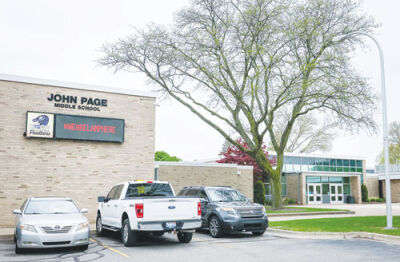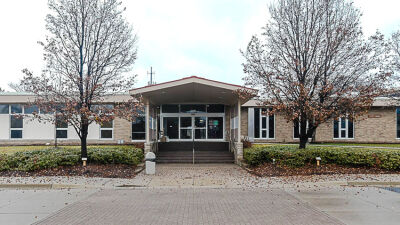
Nearly 58% of voters rejected an $85 million bond proposal by the Lamphere Schools that would have paid for a variety of projects, including a robotics learning center at Page Middle School.
Photo by Patricia O’Blenes
MADISON HEIGHTS — Nearly 58% of participating voters rejected a Lamphere Schools tax proposal during the special election May 6. The proposal would have raised taxes by hundreds of dollars each year to pay for enhancements at buildings across the district.
Of the 2,515 people who voted, 1,449 voted “no,” while 1,066 voted “yes.”
The proposal sought to raise $85 million over the next 30 years by increasing the school millage rate by an estimated 4.15 mills each year. The school collects $1 for every $1,000 of taxable value, multiplied by the millage rate.
Had it passed, the owner of a home with a market value of $200,000 and a taxable value of $100,000 would have seen their annual taxes increase by $415, starting with the bill this summer.
The bond would have funded a variety of items, from the construction of a new auxiliary gym and the conversion of the high school’s shop area into a 3D fine arts studio, to the creation of a robotics learning lab at the middle school and upgrades to roofing, security and more.
Critics were mixed on the necessity of some items bundled with the bond. Special elections in the spring also typically have lower turnout. The May 6 election was requested by the Lamphere Schools at an estimated cost to the district of about $35,000, according to the city clerk, Cheryl Rottmann. The Lamphere bond was the only local issue on the ballot.
In the weeks leading up to the election, residents were concerned about how a tax increase in the current economic climate would impact them or their neighbors, including seniors living on fixed incomes, residents watching their retirement accounts lose value, and recent homebuyers hit with steep assessments.
“It would have been an insane increase, all at once,” said Mitchell Szpanelewski, a resident in the district who also graduated from the Lamphere Schools. “So many items are completely unnecessary. It’s also ridiculous how they could’ve run this issue at no cost back in November but chose to try it now.”
The district currently has a separate 3-mill sinking fund in place that was renewed in 2017 for a period of 10 years, and that will next be up for renewal in 2028. The sinking fund pays for smaller projects.
The last major bond in the district was a $35 million bond in 1997 that was paid off seven years early.
It should be noted that the number of mills is estimated, and variables such as interest rates can change the number of mills required to retire a bond, making it difficult to compare bonds across districts.
At press time, school officials had not answered a request for comment.
Dale Steen, the superintendent, previously told the Madison-Park News that the district has been “extremely fiscally responsible with the taxpayers’ money.” He said the district had identified more than $150 million worth of projects that were then narrowed down to “high-priority items” totaling $85 million.
These included more security cameras, secure entry points and safety glass to slow down intruders; parking lot renovations to improve traffic flow, reduce congestion and streamline drop-off and pickup times; roof replacements, and upgrades to mechanical systems such as heating and cooling.
The bond also called for the conversion of the high school’s shop area into a 3D art studio for the fine arts program; the creation of a robotics learning lab at Page Middle School; upgrades to the theater stage, dressing rooms and technology at Lamphere High; new playground equipment at the elementary schools; enhancements to art and music classrooms, as well as STEM classrooms; gym renovations at the high school and middle school; the construction of an auxiliary gym; and synthetic turf for the baseball and softball infields.
“The needs will not go away (without this bond),” Steen previously said. “The school district will continue to use the sinking fund for small-scale improvements. Major replacements or updates may require the school district to use operational revenue.”
Szpanelewski feels the proposal overreached, and that taxpayers dodged a bullet.
“Seniors would’ve been priced out of their homes. New homebuyers already face a huge increase in their taxes after their first year in the city, and this would’ve bumped it up even more — a double surprise,” Szpanelewski said. “It would’ve hurt the community more than it’s already hurting.”
 Publication select ▼
Publication select ▼


























